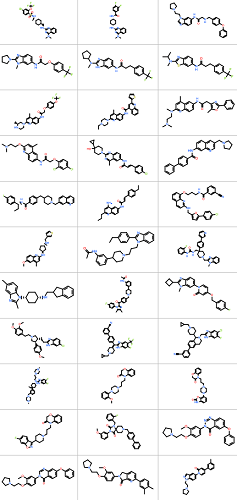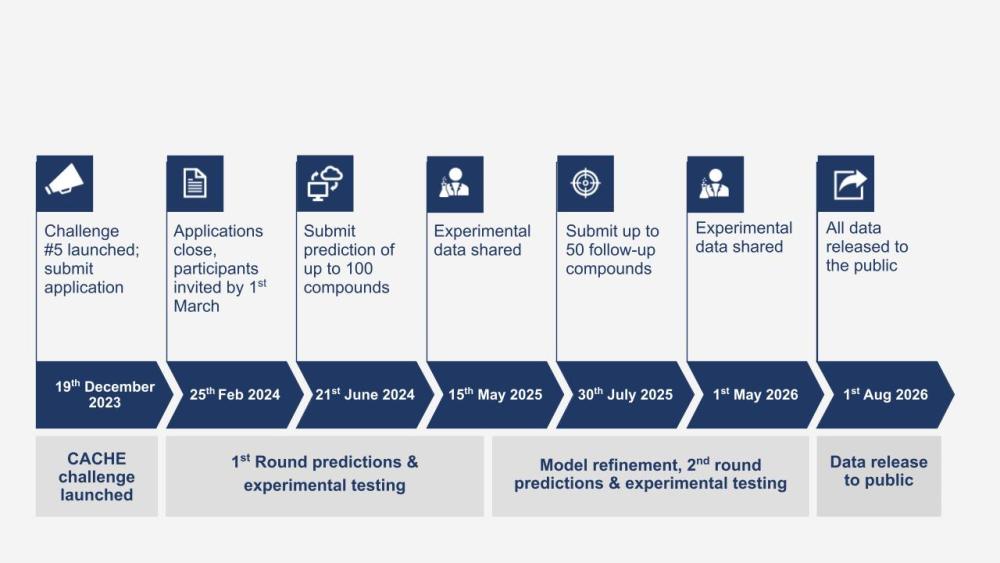Challenge #5

Click image to enlarge
Predicting Novel MCHR1 Antagonists
The fifth CACHE challenge is focused on MCHR1, a G-protein coupled receptor. A chemically diverse array of compounds were previously reported and no experimental protein structure is available. We are providing here two sets: 2605 compounds from ChEMBL (confidence score 8 or higher) and 753 patent compounds, with IC50 values ranging from low nM to high µM. CACHE participants are asked to predict up to 100 chemically novel antagonists each, with an IC50 for MCHR1 below 30 µM. Compounds will be tested in Dr. Bryan Roth’s laboratory at University of North Carolina in a competition assay with a tritiated 19-mer cyclic peptide agonist. Potent molecules validated in this biophysical assay will be tested in a functional cellular assay to evaluate their antagonist activity. While close analogs to known ligands will not be dismissed, chemical novelty will be one of the metrics used by the independent Hit Evaluation Committee.
The Roth laboratory will cover 100% of the costs of testing compounds experimentally. CACHE will cover 25% of the costs of procuring the compounds for eligible academics and companies with less than 20 employees, and 50% of the costs for participants whose entire computational pipeline is open source (no proprietary software). For this Challenge, CACHE will cover 100% of the costs for eligible Canadian academics and 50% for Canadian companies. CACHE can provide letters of support for academics outside of Canada wishing to apply for grants to facilitate participation in CACHE challenges.
A total of 25 applicants will be invited to participate in this challenge, following a double-blind peer review process where each applicant is asked to review 5 applications.
Read more under Details below.
CACHE is strongly committed to equity, diversity and inclusion. We strive to create an initiative that welcomes participants from countries, institutions and groups that are underrepresented in our research community. We endeavour to work with individuals who contribute to furthering the diversity of ideas and approaches, welcoming all communities to participate in our challenges.
All applications and submissions to this CACHE Challenge are subject to the CACHE Terms of Participation.
2023-12-19
2024-02-25
Timeline

Details
MCHR1 - Melanin-concentrating hormone receptor 1
| Parameter | Description | |
|---|---|---|
| Accession | Q99705 · MCHR1_HUMAN | |
| Disease association | Obesity (PMID: 25505557, 12118247, 12885269), sleep disorders (PMID: 19188611, 36177357) and potential roles in depression and anxiety disorders (PMID: 17237257, 33372169) | |
| Challenge | Predict compounds that act as antagonists of MCHR1, preferably with novel chemical templates and IC50 below 30 micromolar. | |
| Why MCHR1 antagonists? | Melanin-concentrating hormone (MCH) regulates food intake through activation of the receptor MCHR1. MCHR1 antagonists are effective in body weight loss driven by decreased food intake while preserving energy expenditure and MCHR1 antagonists have advanced to clinical trials. MCHR1 antagonists are also effective in other physiological functions and behaviors, including sleep, anxiety, depression, and learning. | |
| Pharmacological landscape | Several potent small molecule MCHR1 antagonists have been reported in the literature and patent applications (PMID: 25522065). SDF files for high-confidence literature and for patent compounds are provided. | |
| Macromolecular structures | No experimental structure is reported. | |